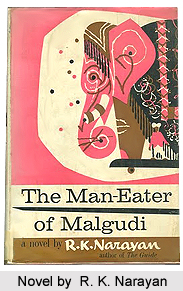 The eternal war between good and bad, the battle between goodness and evil, gains a rather contemporary dimension in the story "the man eater of Malgudi. Vasu, the character depicted as a demonic one terrorizing the mankind is ideally illustrated in the book whilst echoing the fecundity of the title of the novel. R.K. Narayan with his distinct innovativeness creates the backdrop of this story whilst adding a whole fresh meaning to the term "contemporaneousness".
The eternal war between good and bad, the battle between goodness and evil, gains a rather contemporary dimension in the story "the man eater of Malgudi. Vasu, the character depicted as a demonic one terrorizing the mankind is ideally illustrated in the book whilst echoing the fecundity of the title of the novel. R.K. Narayan with his distinct innovativeness creates the backdrop of this story whilst adding a whole fresh meaning to the term "contemporaneousness".
R. K. Narayan is a celebrated Indian writer. He is the greatest Indian storyteller ever. He tells his story in a very convincing way with a touch of practical thought as well as fantasy. His books are bound to mesmerize anyone in own special way. R. K. Narayan`s books enable the reader to feel the place and his narrative is so real that anyone can see his stories like the films. Blessed with a modest nature he even sometimes laughs at his own work. He is a wonderful writer with lucid language having a Tamil touch in his write-ups. His talent goes beyond mere aptitude with words or an irregular Malgudi. Narayan stands for the immense flexibility and adaptability in his work. He uses the language of Bible, Shakespeare and American Constitution as well to an amazing effect while dealing in subjects. His creatures squat on the floor for meals, wear dhoti with a coat, read the Ramayana, regard mothers as sacred, rebel against fathers, marry for love over money, and aspire for eternal life. The author writes all this without a single footnote. R. K. Narayan passed away on 13th May 2001. Malgudi lives on. And so does his writing.
Synopsis:
`The Man-Eater of Malgudi` is also set at the same background of Malgudi where the name itself says so.
Nataraj is owner of a small, friendly printing press in Malgudi. He is a very polite person with no enemy as such. His life is tensionless till the day he meets Vasu. Vasu is a taxidermist. Vasu brings an alarming stuffed jungle of hyenas, pythons and tigers and an assortment of dancing girls who clump up and down the printer`s stairs. Vasu was creating many problems to Nataraj`s life. Vasu never gives him money nor he signs any rent slip. During story`s progression Vasu encroaches Nataraj`s life in all aspects. The story comes to an end when Nataraj decides to organize a function on the release of a book of his friend. But very soon someone informs that Vasu is going to kill the elephant at the procession. Nataraj decides to talk to Vasu for the last time but he finds him sleeping. But on the next day Vasu was dead. Though Nataraj gets a clean chit from police still his friends` starts avoiding him. Eventually he knows from Rangi, a prostitute that Vasu was not murdered but he had damaged one of his nerves with his powerful hands while smashing a fly and died instantly.
This `The man-eater of Malgudi` is published by William Heinemann Ltd, Reader`s Union, Viking adult, Penguin classics, Penguin Books Ltd, Indian Thought Publication, four square, New English Library, etc.
`The Man-Eater of Malguri` is somewhat complex in its nature as R. K. Narayan loosely bases his tale on the ancient Indian myth of a boasting demon Bhasmasura who terrorizes the world of mortals. This story is mainly based on the battle between good and evil and also how these values are determined by the society. This novel also exceeds some of the boredom, horror and glory that make up anyone`s existence.













